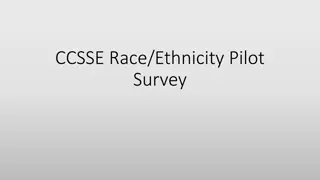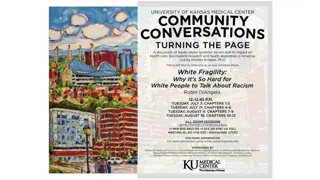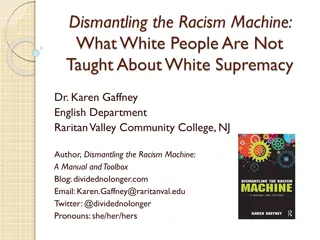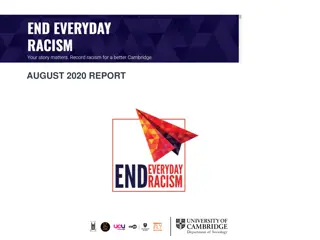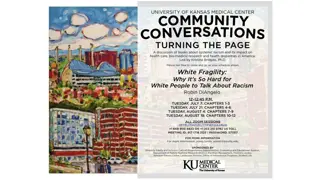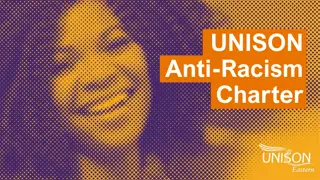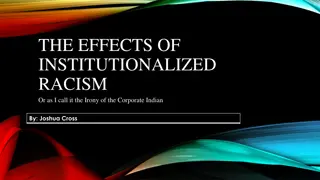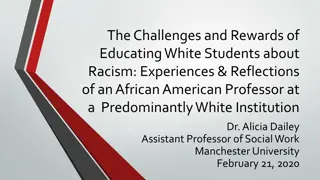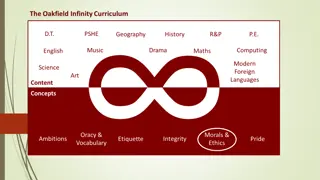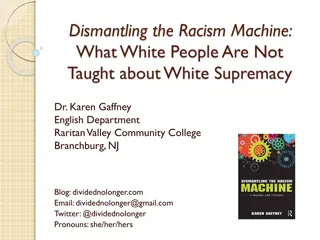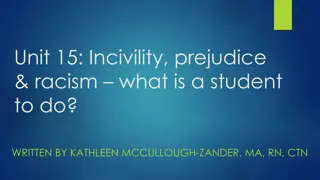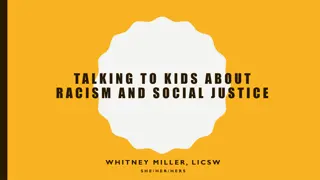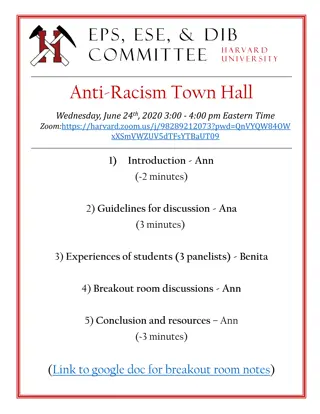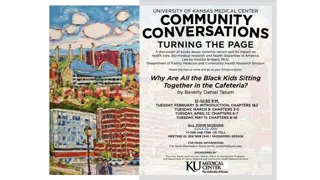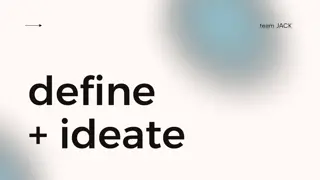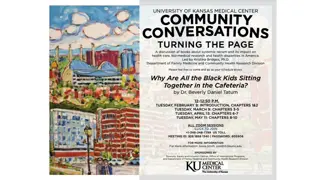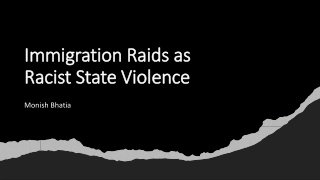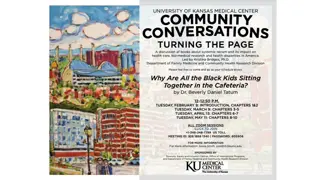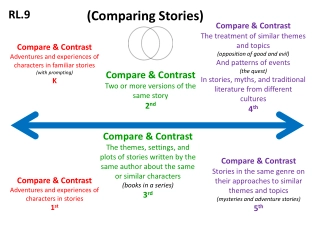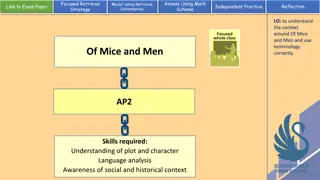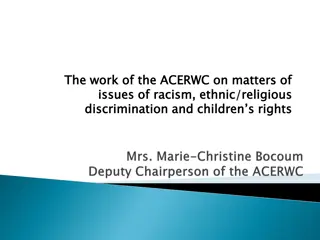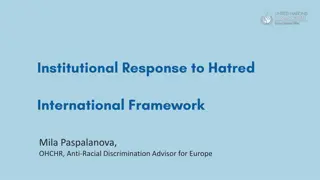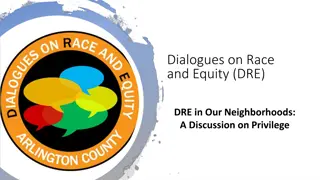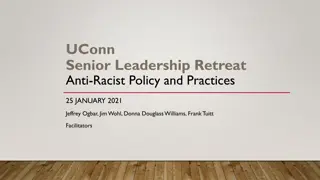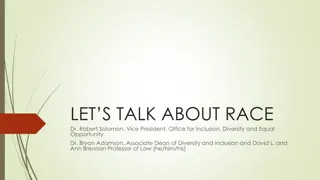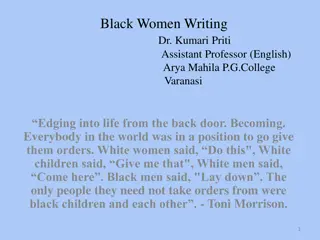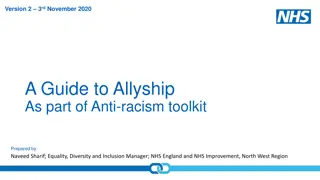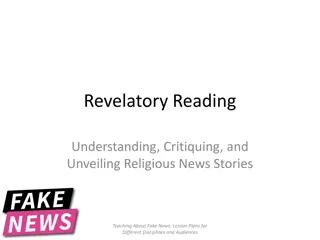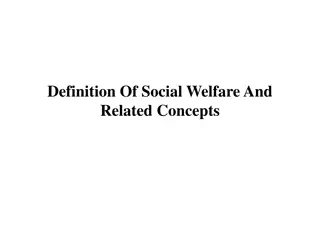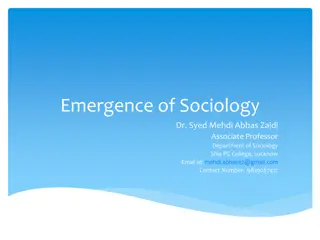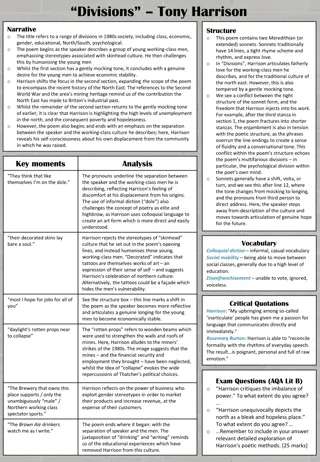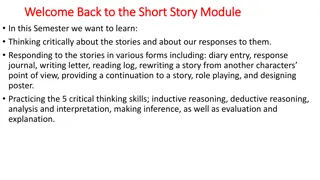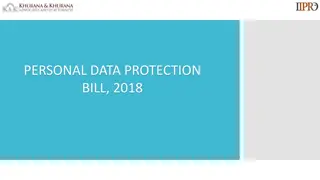Reflecting on Racism: Personal Stories and Societal Reflections
Explore diverse perspectives on racism and racial disparities through personal narratives and societal observations. Engage in conversations about identity, cultural heritage, and confronting biases. Witness the impact of historical patterns and systemic injustices on individuals and communities, with a focus on fostering empathy, discomfort, and action towards systemic change.
Download Presentation

Please find below an Image/Link to download the presentation.
The content on the website is provided AS IS for your information and personal use only. It may not be sold, licensed, or shared on other websites without obtaining consent from the author. Download presentation by click this link. If you encounter any issues during the download, it is possible that the publisher has removed the file from their server.
E N D
Presentation Transcript
Understand history, patterns, and systems Practice talking about racism and racial disparities Personal learning and growth to create a shift within individuals Provoke an emotional state (discomfort, empathy, outrage) that raises our consciousness Commit to action and systems change The purpose of this book club
Summer 2021 June 8th The Color of Law part 1 July 13th The Color of Law part 2
August 10thThe Land of Opportunity Documentary Screening and discussion with Nicholas Nico Wiggins
May 11th Part IV: Beyond Black and White and Breaking the Silence (Chapters 8-10)
Latinx Native American Asian and Pacific Islanders Middle Easterners and North Africans There s more than just Black and white, you know.
To get to know my culture, I would tell my teachers to understand my language. Take a course or something The other way they can learn about our culture is the ask us about it. Ask us. -Latinx high school student There s a certain amount of anger that comes from the past, realizing that my family, because they had to assimilate through the generations, don t really know who they are. American Indian college students Student Voices
Being an Asian person, a person of color growing up in this society, I was taught to hate myself. I did hate myself, and I m trying to deal with it. -Asian American college student I m not really sure I understood what was going on when 9/11 happened, but I was old enough to feel the world shift on its axis that day and change everything forever. Muslim girl of Middle Eastern heritage Student Voices
Racism increases the need for a positive self- defined identity in order to survive psychologically. To find one s racial or ethnic identity, one must deal with negative stereotypes, resist internalizing negative self- perceptions, and affirm the meaning of ethnicity for oneself. Identity development for racial and ethnic groups targeted for oppression
The Fairytale of Racism Ignorance and Hate Racist Ideas Racist policies
Racist ideas have always been a functional necessity to a Christian nation that was economically founded upon slavery while being politically and philosophically dedicated to the principles of liberty and freedom. Racist ideas historically developed to justify oppression Hardly any of their segregating, colonizing, enslaving and slave- trading predecessors thought they were racist. They proclaimed that they were speaking the truth, the truth of science, of nature, of logic, of religion. As Frederick Douglass noted: When men oppress their fellow men, the oppressor ever finds, in the character of the oppressed, full justification for his oppression.
History of racist images and rhetoric in the US
This is not a thing of the past California launched an investigation and determined that at least 144 incarcerated women were illegally sterilized between 2006 and 2010 . (24% Black & 37% Latinx)
Racism against AAPI Communities
The authors response: She needs to fight for herself. She has been damaged by the cycle of racism, too. If she speaks because she needs to, then it would be less important to her whether people of color are appreciative of her comments. Yes there is fear, the fear of speaking is overwhelming. I do not feel, for me, that it is fear of rejection from my own race, but anger and disdain from people of color. The ones who I am fighting for. White silence about racism The paralysis of fear
People of every race can be scared and/or uncomfortable speaking up about race
We all have a sphere of influence. Each of us needs to find our own sources of courage so that we will begin to speak. There are many problems to address, and we cannot avoid them indefinitely. We cannot continue to be silent. We must begin to speak, knowing that words alone are insufficient. But I have seen that meaningful dialogue can lead us to effective action. Change is possible. We must begin to speak
Washington University School of Medicine - Internal Medicine The journey from racism to anti-racism must happen on many levels (individual, institutional, community, organization etc.). To be anti-racist, the easiest place to start is with personal action. We are called on to act even when we are uncertain, afraid, not fully informed, and uncomfortable. Consider and reflect on this info-graph that shows how anti-racism progresses from fear, to learning, to growth. The key here is taking personal action.
Policy Social-ecologicalmodel Vote Advocate for change Community Volunteer Organizational Hiring and retention Voices at the table Examining policies Antiracist Action Interpersonal Stop microaggressions Expand your network Individual Learn the history/patterns Challenge assumptions Racial identity development
1. What stands out to you from the reading or todays presentation? 2. Do you feel scared/uncomfortable to speak up about race? What are the fears/thoughts that stop you? Discussion Questions 3. What is your sphere of influence? How can it be used to interrupt the cycle of racism? If you are hesitant, what is holding you back? 4. What support do you need to become a more effective change agent?
Honor Confidentiality Small Groups Choose courage over comfort Regard feedback as a generous gesture that should always be met with gratitude


